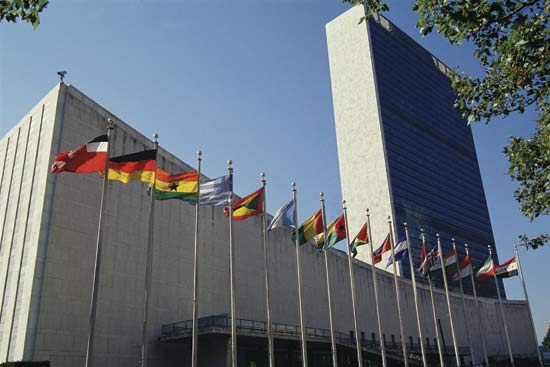Azerbaijan urges UN to end Armenia's impunity for grave crimes (UPDATE)

By Sara Rajabova
The Azerbaijani government has demanded that the United Nations put an end to the impunity of Armenia over the grave crimes committed against Azerbaijan.
Azerbaijan's Ambassador to the UN Agshin Mehdiyev has sent a memorandum entitled "Crime in Khojaly: guilty persons, qualification of actions and responsibility under international law" to the organization's Secretary General.
By presenting the memorandum, Baku requests the UN chief and the member states of the UN to support the efforts made by his country to end the impunity for the grave crimes committed during the aggression of Armenia against Azerbaijan, according to the UN Information Center.
"The serious violation of international law, such as war crimes, crimes against humanity and genocide were committed as a result of the ongoing aggression of Armenia against Azerbaijan. An unprecedented massacre of the Azerbaijani population in Khojaly town was committed twenty-one years ago," the letter says.
"Obviously, the impunity of these crimes continues to impede the achievement of the long-expected peace and reconciliation between Armenia and Azerbaijan. Therefore, establishing the facts of serious violations of international humanitarian law and human rights that took place during the conflict, providing adequate and real compensation to the affected people and taking necessary institutional measures to prevent the recurrence of such violations are essential conditions for genuine resolution of the conflict," it says.
Mehdiyev said that accordingly, ending the impunity is important not only for establishing the responsibility of the conflict parties and the perpetrators, but also for ensuring a lasting peace, establishing the truth, reconciliation, protecting human rights and interests of the victims and the well-being of society as a whole.
The Khojaly genocide committed against Azerbaijanis by Armenians during the 1990s war is gaining international recognition, as the number of the countries recognizing this massacre is rising by the day.
Recently, Oklahoma became another U.S. state to recognize the Khojaly genocide.
Also, the U.S. states of New Mexico, Arkansas, Georgia, Texas, New Jersey, Maine and Massachusetts' state legislatures have adopted resolutions condemning the Khojaly massacre.
Resolutions on the Khojaly tragedy have also been passed in the parliaments of Turkey, Pakistan, Mexico, and Colombia, as well as the Organization of Islamic Cooperation (OIC).
This year, such resolutions were adopted in the parliaments of the Czech Republic, Romania, Serbia and Bosnia and Herzegovina.
The town of Khojaly was situated within the administrative borders of the Nagorno-Karabakh region of Azerbaijan. Its population constituted over 7,000 people.
Late into the night of February 25, 1992, Khojaly came under intensive fire from the towns of Khankendi and Askeran already occupied by Armenian armed forces. The Armenian forces, supported by the ex-Soviet 366th regiment, completed the surrounding of the town already isolated due to ethnic cleansing of the Azerbaijani population of the neighboring regions. The joint forces occupied the town, which was ruined by heavy artillery shelling.
Thousands of fleeing civilians were ambushed by the Armenian forces. Punitive teams of the so-called Nagorno-Karabakh defense army reached the unprotected civilians to slaughter them, mutilating and scalping some of the bodies. 613 civilians, including 106 women, 70 elderly and 83 children, were killed in the massacre. A total of 1,000 civilians were disabled. Eight families were exterminated, and 25 children lost both parents, while 130 children lost one parent. Moreover, 1,275 innocent people were taken hostage, while the fate of 150 remains unknown.
Here we are to serve you with news right now. It does not cost much, but worth your attention.
Choose to support open, independent, quality journalism and subscribe on a monthly basis.
By subscribing to our online newspaper, you can have full digital access to all news, analysis, and much more.
You can also follow AzerNEWS on Twitter @AzerNewsAz or Facebook @AzerNewsNewspaper
Thank you!
